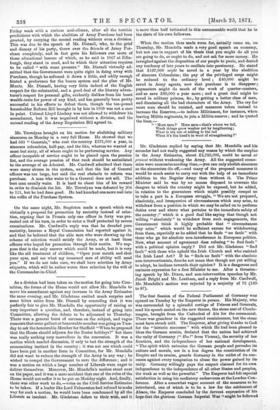Mr. Gladstone replied by saying that Mr. Mundella and his
seconder had not really suggested any means by which the surplus- in the Army Estimates, about £2,750,000, could be saved at present without weakening the Army. All the suggested econo- mies were economies needing time,—you can only abolish sinecures• as the sinecurists die off,—and many of the proposed measures it would be much easier to carry out with the help of an immediate- addition to the Regular Army than without it. The Prime Minister said he was by no means disposed to overrate the• dangers to which the country might be exposed, but he added,. in relation to the guarantees which might possibly compel us• to take a part in a European struggle, " We are not prepared, absolutely, and irrespective of circumstances which may arise, to- withdraw from a position in which we may be called on to perform duties over and above what pertains to the immediate safety of the country ;" which is a good deal like saying that though not willing " absolutely " to withdraw from such engagements, the Government think it highly probable that " circumstances. may arise" which would be sufficient excuse for withdrawing from them, especially as he added that he finds " no fault" with those who go for absolute non-interference in European politics. Now, what amount of agreement does refusing " to find fault with a political opinion imply ? Did not Mr. Gladstone "find fault" with those who upheld the Irish Church and who resisted the Irish Land Act? If he "finds no fault" with the absolute- non-interventionists, does he not mean that though not yet willing to adopt, he inclines towards their opinion ? It is a dangerous and ominous expression for a first Minister to use. After a threaten- ing speech by Mr. Dixon, and non-intervention speeches by Mr. Jacob Bright and Mr. Leatham, and a reply from Mr. Cardwell, Mr. Mundella's motion was rejected by a majority of 73 (160 to 87).


































 Previous page
Previous page